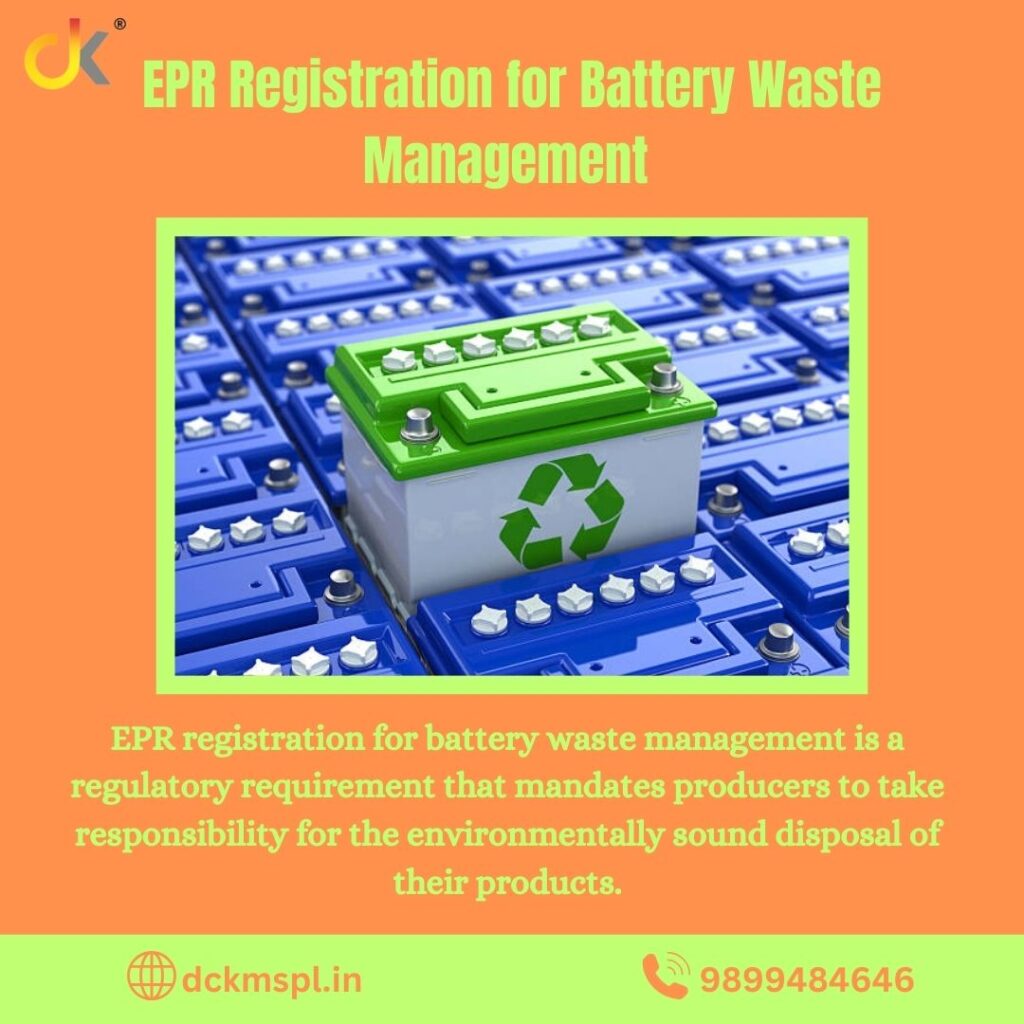Extended Producer Responsibility (EPR) has emerged as a pivotal framework for addressing environmental challenges associated with battery waste management. With the rapid growth of industries and the widespread use of batteries in various sectors, managing the resultant waste has become a pressing concern. EPR registration ensures that producers, importers, and brand owners are held accountable for the end-of-life management of their battery products, promoting sustainability and compliance with environmental regulations.
Understanding EPR in the Context of Battery Waste
EPR registration for battery waste management is a policy approach under which producers bear the responsibility for the entire lifecycle of their products, including collection, recycling, and safe disposal. When applied to batteries, this framework addresses the significant environmental risks posed by improper disposal, including soil contamination, water pollution, and toxic emissions.Batteries, particularly those containing heavy metals like lead, cadmium, and lithium, are hazardous if not managed responsibly. By enforcing EPR registration, authorities aim to streamline the process of recycling and ensure eco-friendly disposal, reducing the adverse impacts on ecosystems and human health.
Key Objectives of EPR Registration for Battery Waste
- Reduce Environmental Pollution: EPR mandates producers to adopt sustainable practices, minimizing the harmful effects of battery waste.
- Encourage Recycling: By fostering a circular economy, EPR promotes the recovery and reuse of valuable materials like metals and electrolytes from used batteries.
- Ensure Compliance: EPR registration ensures adherence to government policies and international environmental standards.
- Promote Awareness: It educates stakeholders about the importance of responsible battery waste management.
The EPR Registration Process
The EPR registration process involves several steps to ensure compliance and effectiveness in battery waste management. Here’s a breakdown:
Step 1: Producer Identification
Producers, including manufacturers, importers, and brand owners, must identify their role in the battery lifecycle. This involves assessing the types of batteries they produce or import and their potential environmental impact.
Step 2: Application Submission
Producers must apply for EPR registration with the designated regulatory authority. The application includes details about the types and quantities of batteries produced or imported, proposed waste management plans, and recycling mechanisms.
Step 3: Waste Management Plan Approval
The authorities review the submitted waste management plan to ensure it aligns with environmental standards. This plan must include provisions for collection centers, transportation logistics, and partnerships with authorized recyclers.
Step 4: Issuance of EPR Certificate
Upon approval, the producer receives an EPR certificate, which serves as proof of compliance. This certificate is subject to periodic renewal based on adherence to waste management protocols.
Step 5: Implementation and Reporting
Producers are required to implement the approved waste management plan and submit regular reports to the authorities. These reports document the quantity of waste collected, recycled, and disposed of, ensuring transparency and accountability.
Challenges in Battery Waste Management
Despite the benefits, implementing EPR for battery waste management comes with challenges:
- Collection Infrastructure: Establishing an extensive network for collecting used batteries is complex and resource-intensive.
- Recycling Technology: Advanced technologies are required to recycle batteries efficiently and safely, which may not be readily available in some regions.
- Awareness Among Stakeholders: Consumers and small producers may lack awareness of their role in battery waste management.
- Compliance Monitoring: Ensuring that all producers adhere to EPR guidelines requires robust monitoring and enforcement mechanisms.
Benefits of EPR Registration for Battery Waste
EPR registration offers numerous benefits, not only for environmental protection but also for economic growth and societal well-being:
- Environmental Sustainability: Proper recycling and disposal reduce pollution and conserve natural resources.
- Economic Opportunities: The recycling industry generates jobs and fosters innovation in waste management technologies.
- Corporate Responsibility: EPR enhances a company’s reputation by showcasing its commitment to sustainability.
- Consumer Trust: Brands adopting EPR earn the trust of environmentally conscious consumers.
Role of Stakeholders in EPR Implementation
The success of EPR for battery waste management depends on the active participation of various stakeholders:
- Producers: Design eco-friendly products and ensure proper waste management.
- Government Authorities: Enforce regulations, monitor compliance, and provide incentives for sustainable practices.
- Consumers: Dispose of used batteries responsibly and support brands committed to recycling.
- Recyclers: Develop and adopt efficient recycling technologies to recover valuable materials.
EPR and the Global Perspective
Countries worldwide are adopting EPR frameworks to tackle battery waste. In Europe, the Battery Directive ensures producer responsibility for battery waste management. Similarly, India’s Battery Waste Management Rules align with global best practices, mandating EPR registration for all producers.These global efforts highlight the universal importance of EPR in addressing the environmental challenges posed by battery waste.
Future of EPR in Battery Waste Management
The future of EPR in battery waste management lies in technological innovation and greater collaboration among stakeholders. Here are some key trends:
- Advanced Recycling Methods: New technologies, such as hydrometallurgy and pyrometallurgy, are making battery recycling more efficient.
- Digital Tracking: Blockchain and IoT-based systems are being used to track batteries throughout their lifecycle, ensuring transparency and compliance.
- Global Alliances: International partnerships are fostering knowledge-sharing and capacity-building in battery waste management.
- Consumer Incentives: Reward programs for returning used batteries are encouraging consumer participation in waste management initiatives.
Conclusion
EPR registration for battery waste management is a crucial step towards achieving environmental sustainability. By holding producers accountable for the lifecycle of their products, this framework ensures that batteries are managed responsibly, minimizing their ecological footprint.As more nations adopt EPR and integrate innovative technologies, the global community moves closer to a circular economy. For producers, EPR is not just a regulatory requirement but an opportunity to demonstrate corporate responsibility and contribute to a greener future. By embracing EPR registration, stakeholders can collectively address the challenges of battery waste and pave the way for a sustainable tomorrow.
